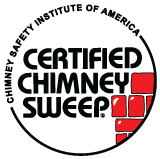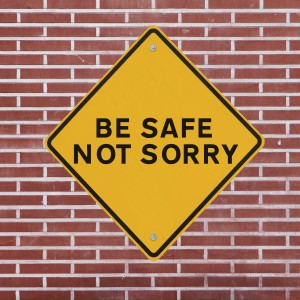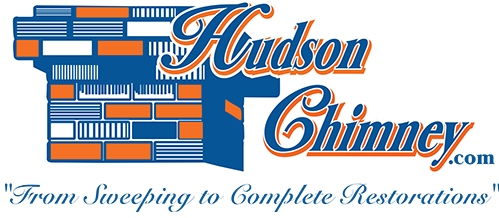by Mark Hudson | Sep 30, 2014 | CSIA Certified
When looking for a chimney sweep to entrust with the task of cleaning and inspecting your chimney, you may wonder how you are supposed to distinguish a good chimney sweep from a bad one. After all, you want to hire a professional who knows what he or she is doing and who can help you to protect your home from the dangers that owning a chimney can present. The Chimney Safety Institute of America is a non-profit organization that reviews and certifies chimney sweep companies in order to provide homeowners with a standard for their chimney needs.

To be CSIA certified, a chimney technician must attend a review session and pass an exam covering Successful Chimney Sweeping (2011), National Fire Protection Agency 211 (2013), and the 2006 International Residential Code. Anyone applying for certification must also sign the CSIA code of ethics and pay an annual fee. In order to remain certified, this process must be repeated by the technician every three years.
These procedures for certification create a method for homeowners to determine if a chimney sweep is qualified to clean and inspect a chimney in a professional and informed manner. Chimneys and appliances can cause fires and carbon monoxide leaks if not properly maintained. Therefore, making sure your chimney sweep knows what he or she is doing in addition to being dedicated to helping you detect and fix potential problems is of the utmost importance.
It is significant to note that the CSIA not only seeks to educate and evaluate technicians, but also to provide an ethical code for professionals to follow. When technicians sign this code, they pledge to conduct business in an honest and fair manner, as well as to remain knowledgeable and up to date on all chimney standards and procedures. They also agree to do their best to educate you, the consumer, and to act in a professional and respectful manner.
Hudson Chimney is certified by the CSIA, so you can be sure that you will be in good hands. The technicians at Hudson Chimney have been servicing the Jacksonville, Florida Area for over thirty years, ensuring their clients clean, safe, and warm homes with efficient heating systems. You can trust the professionals at Hudson Chimney to be knowledgeable in their skills and to provide you and your appliances with service of the highest quality.
If you have any questions about CSIA certification or policies, or if you have any questions about chimneys and appliances as a homeowner, be sure to check out CSIA.org for more information. Their website is an informative and reliable resource of educational material for your benefit.
Also, if your chimney has not been serviced this year yet, schedule an appointment with a technician at Hudson Chimney as soon as possible. The fall and winter are busy for any chimney servicing company, and the sooner you call, the more likely your home will be prepared for the colder winter months. The professionals at Hudson Chimney will make sure your chimney is prepared!
by Mark Hudson | Jul 15, 2014 | chimney maintenance, fire safety, fireplaces

It’s important to know what could happen if you keep on ignoring your chimney’s needs. Negligence on your part might bring you to regret not taking care of it.
If you have ever wondered why the Chimney Safety Institute of America (CSIA), along with numerous other fire safety and government health organizations, recommend an annual chimney sweeping and inspection, “dirty chimneys kill.” While we are not trying to scare you into scheduling your yearly chimney cleaning, Hudson Chimney would like to tell you exactly why you need an annual chimney sweep and inspection, so you can understand the urgency behind following this important step of chimney maintenance.
1. A chimney sweeping removes the buildup of creosote from the walls of your chimney.
If you burn wood, creosote will occur naturally during condensation from when smoke, gases, and vapors from your fireplace exits the upper, cooler walls of your chimney. Sticking around as a residue, creosote can be black or brown and varies in appearance. Whether it is shiny and hard, crusted and flaky, or gummy and tar-like, creosote is highly combustible. If enough of the creosote residue builds up in your chimney and the internal flue reaches high temperatures, you have the makings of a dangerous chimney fire. An annual chimney cleaning from a CSIA-certified company like Hudson Chimney can remove creosote deposits before they can become large enough to ignite a fire.
2. A chimney inspection will alert you to any water penetration damage that might exist in your chimney.
If you own a masonry chimney, you should know that the CSIA has called water the number one enemy of the bricks and mortar of your chimney. For good reasons, water penetration can cause extensive and expensive damages and repairs to masonry fireplaces and chimneys. From loose bricks and mortar to rusted appliances to serious structural deterioration, the destruction caused by water can be alarming. Hudson Chimney can find the leak that is causing the damage, repair the leak and damage, and then apply a waterproofing sealant to prevent any more water penetration of your masonry chimney.
3. A chimney sweeping and inspection can prevent toxic gases like carbon monoxide from entering your home.
Unfortunately, cases of carbon monoxide poisoning are on the rise, due to the focus on energy-efficiency. While the temperate air is sealed in, saving you money, the toxic by-products of combustion are also sealed inside, as air flow has been restricted. If there is not enough oxygen coming in to completely burn the fuel, carbon monoxide is produced, and since you cannot see, smell, or taste it, you and your family could be breathing it in for quite a while. A CSIA-certified inspection from Hudson Chimney will ensure the drafting and venting is working to keep the air flow going through the house, bringing oxygen to the heating source. A sweeping will also remove any possible blockages like animal nests to prevent another source of carbon monoxide invading your home. If you and your family develop flu-like symptoms that do not disappear, ask your doctor for a carbon monoxide blood test to be sure your health is not at risk.
If you have not scheduled your annual chimney sweeping and inspection this year, contact Hudson Chimney today. Proper chimney maintenance begins with this important step.
by Mark Hudson | Jun 10, 2014 | chimney maintenance

Leaky chimney got you down? Give the pros at Hudson Chimney a call!
Hudson Chimney has been giving quality chimney services for over thirty years now. And throughout our experience, we’ve collected a considerably wide knowledge when it comes to chimney problems and issues.
One of the most common issues that we’ve encountered throughout our experience is the case of the leaky chimney. Seven out of ten households with chimneys have been complaining about leaks and are asking for help to resolve said issue.
Here are a few things that you may find informative and rather helpful.
The common causes of chimney leaks:
- Although chimneys are generally concrete, there are cases wherein only the outside is solid and the inner portion is filled with solid fillers. According to the Chimney Safety Institute of America, majority of the masonry materials utilized are actually porous and are prone to absorbing water. The process of filling the brick plus the nature of the materials used makes the brick more susceptible to having cracks and channels that may serve as an entrance for water. One cracked brick is relatively harmless. But imagine fifty bricks or more? The amount of water that can pass through that is enough to cause an annoying leak around your house.
- For aesthetic purposes, many people make use of fashionable bricks in their chimneys. These bricks are more porous and rough on the surface compared to its regular counterpart. The key thing to look out for when using fashionable bricks is its flashing. The most preferred and advisable flashing to utilize is either the lead, lead coated copper or the copper (gold).
- Chimney flashing is done to prevent leakage. But sometimes when flashing is improperly installed, worn, inadequate or even corroded, this would backfire and cause what it’s meant to prevent in the first place.
Warning signs that your chimney is leaking:
- When you hear a constant, omnipresent dripping noise.
- Cracks and deterioration in the flue lining
- Water stains on or around your chimney
What you can do to fix it!
Your first instinct once you suspect your chimney is leaking is to go up there and see for yourself if there’s anything amiss. Although this is relatively the first thing you can do, it’s not as practical and effective as you may think. 80% of the time, people without training won’t be able to detect a leaky chimney or know how to remedy it. The quick and effective solution? Call our professionals and schedule an appointment as soon as possible so we can have your chimney waterproofed as well as install a chimney cap or crown!
by Mark Hudson | Nov 18, 2013 | chimney maintenance
Chimney Inspections and What They Cover
It is highly recommended that homeowners have their chimneys inspected on an annual basis. Having a professional come in to look at the chimney is the best way to spot any potential hazards before they endanger the household. Before finding an certified sweep to do the job, it is important to understand exactly what should be included in an annual inspection.
One of the first things that a chimney inspector will look at is the structural integrity of the chimney itself. Over time, a chimney can become damaged or weak, especially if there is excessive exposure to rain and snow. They will make sure that the actual structure is still strong and does not pose any risks to the rest of the home.

When a certified chimney sweep does an inspection of your chimney, there are certain trouble spots that are always checked.
In addition to looking over the general structure of the chimney, the sweep will look at the individual parts. This will include an inspection of the flue liner and damper, among other important elements. They will be able to tell the homeowner whether any individual parts of their chimney require maintenance or repair. Remember, it is necessary for all parts of the chimney to be in good working condition in order for it to function safely.
A chimney professional will be able to tell whether there is a buildup of creosote in the chimney. Creosote is the substance left behind after treated wood and coal have been used for making a fire in the fireplace. It can pose a number of different risks, including internal illness and irritations to the skin and eyes. It is also highly flammable, so a home with a buildup of the material is at a greater risk for a chimney fire than those who have it inspected and cleaned.
During a chimney inspection, there may also be evidence of material clogging the chimney. In many cases, this is the result of animals that have made their home in the flue. A clogged chimney is a serious problem because it prevents smoke and gas from exiting the home the way they are supposed to. As a result, a chimney fire could ignite or the family inside of the home could become ill when they are exposed to the gasses.
It takes specialized training and experience to properly and thoroughly inspect a chimney. The Chimney Safety Institute of America is the organization that trains and certifies all qualified chimney technicians. It is necessary to only use a CSIA certified inspector in order to get the most reliable results. The CSIA website offers a useful tool to help find a qualified technician in the area.
To some homeowners, a chimney inspection just seems like an extra chore and an unnecessary expense. However, an annual inspection is the only way to make sure that the chimney is in good working condition and not putting the home at risk. Be sure to use a chimney inspector who has been trained and certified by the Chimney Safety Institute of America in order to get the best results.




